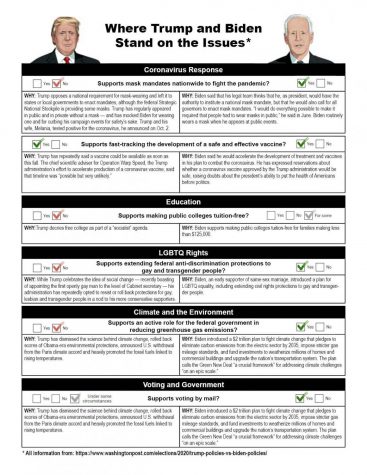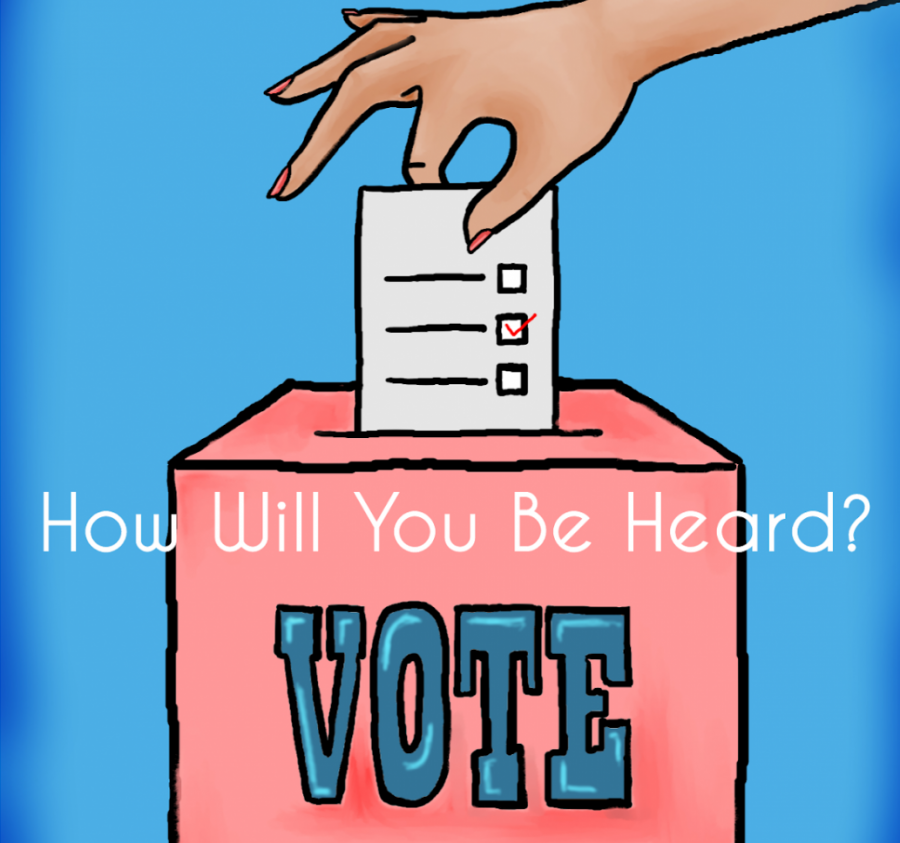Will you choose to be heard?
The importance of student voters in the 2020 presidential election
United We Stand, Divided We Fall. This saying has inspired unity and collaboration between the most polar opposite Americans since the time of the Founding Fathers. We have seen and experienced a lot, even in just the last seven months, yet we find that our voices have been overlooked and overturned. Now, some of us are 18, and it’s time to turn a new page; it’s time be heard as new a voter. The time between today and election day is a narrow window of time that’s open to reflect: Do we as Americans, stand united? Or are we slowly dividing as we fall?
Take a look around Stoughton – hundreds of Biden/Harris and Trump/Pence signs are staked out on lawns, a demonstration of how our constitution embraces our right to express ourselves.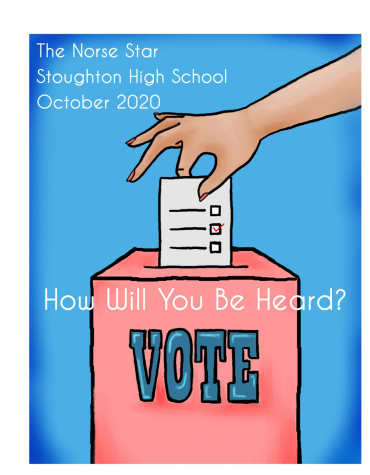
A democracy is only as strong as the voice of its people. Our system calls its citizens, young and old, to exercise our duty: to vote. Today, this action is one of the most important responsibilities of Americans.
From the first celebration of Independence Day, the United States of America has proved to be a strong democratic nation. The citizens have the most influence on who will run the country by electing its leaders.
As the 2020 presidential election nears, the American people are encouraged to vote. But questions still consume voter thoughts: Should we vote? Why should we? Who should be able to vote?
We asked Stoughton history and science teachers questions about their experience with voting, if they plan to vote in the November election, and their opinions of student voters.
Patrick Schneider, history teacher at SHS, gives an important viewpoint of why we should vote. He says, “Anyone who can legally vote absolutely should. We have a government of the people and for the people. If ‘we the people don’t participate, the whole [government] can fall apart.”
“We can’t take democracy for granted. Young people often get ignored by politicians because young people don’t vote in high numbers. Young people should demand respect by voting,” Schneider adds. Many of the responses expressed the same qualities as Schneider’s.
Katy Mullen, social studies teacher at SHS also adds: “They [students] absolutely should vote if they are informed on the issues.” The emphasis on the importance of student voters to exercise their right to vote makes it clear that the teachers at SHS encourage student participation not just for the November election, but the ones that follow.
Deanna Arnold, science teacher at SHS notes that, “Voting is so important and everyone who is able should get educated on the candidates and vote!” If you have the ability to make a difference in how your government is run, why not vote?
Paul Hansen, special education and social studies teacher says, “It’s vital for young adults to vote and take part in our democratic system […] It’s important for lawmakers to know and pay attention to what young people want,” he says, “There’s no such thing as a vote that doesn’t matter.”
After we surveyed teachers, we took the matter of voting to the students. Young voters everywhere will have a significant influence on the outcome of the November election, especially here in Wisconsin.
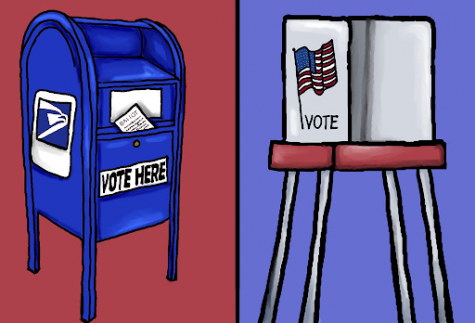
As a swing state, voters ages 18-26 will have the most impact on which way the state swings–blue or red. The 2020 Election Youth Electoral Significance Index explains just how young voters from Wisconsin govern the 2020 presidential election:
“Wisconsin was one of the decisive states in the 2016 presidential election. It flipped from “blue” to “red” from 2012 to 2016, Donald Trump won there by less than 1 percentage point, and the state once again ranks as a toss-up in 2020.”
Wisconsin’s online and same-day voter registration makes it easy for young people to participate in elections, but for some, voting this year could look different. With the risk of exposure to COVID-19, voters in all but four states have the option to request absentee ballots ahead of time. As new as voting remotely may seem, the military has successfully used this system since the Civil War.
In a poll given out to SHS seniors who are voting for the first time, 70% of students preferred to vote in person to gain experience, while the remaining 30% of students preferred to vote through absentee ballots to avoid exposure to the coronavirus.
Carter Keo, a senior at SHS who will vote in the 2020 Presidential Election, explains his decision to vote remotely: “Personally, I believe that no one tampers with the ballots that go through the mail and that there haven’t been any issues with voting through the mail. Our mail in general is confidential to us and no one else opens it. I’m confident that our ballots will be too.”
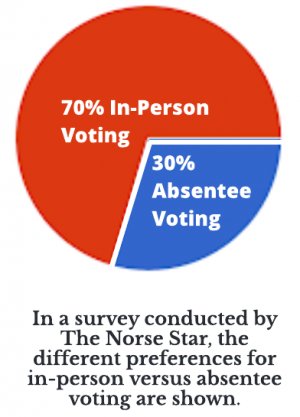
According to the Wisconsin Elections Commission, “All votes are counted securely on election day at local polling places or in/at a central counting facility with voting machines, all of which are federally/state certified and publicly tested for accuracy by local clerks before every election.” As Americans take on their responsibility to vote, election security in Wisconsin will be the responsibility of every poll worker and state official to keep the election fair and accurate.
For those who will brave traveling to the polls this November, the CDC guidelines tell voters that following health safety measures will be vital. This means that the recommendation of wearing masks and practicing social distancing is strongly and highly encouraged. These tactics proved to be effective for in-person voting in the spring elections in Wisconsin. More specifically, the April presidential primary.
According to The Wisconsin Department of Health, Wisconsin had an in-person voter turnout of about 413,220 people of the 1,144,351 total votes in the April primary, and only 67 people contracted the virus as a direct result of in person contact from voting.
Additionally, in an analysis reconstruction of Wisconsin’s epidemic curve in a publication from the American Public Health Association, researchers at the University of Hong Kong and Stanford University concluded that, “there is no evidence to date that there was a surge of infections [from the election].” While these numbers show the risk of voting in person, it’s important to note that protecting public health and voting in person at a poll this November is a possible option.
2020 is a year that will be marked in the history books; from a global pandemic to the presidential election, all the little things count, especially voting. In order to make casting a ballot easy and effective, preparation is key for voters of all experiences.
Holly Licht, Stoughton City Clerk, explains, “I would recommend that everyone make a plan for voting, whether it’s voting absentee by mail, voting early in the clerk’s office, or voting at the polls on Election Day. Make a plan that works for you, and make it early. Things change from day-to-day and you don’t want to miss out on casting your ballot.”
Elected officials shape the way our schools, cities, states and country are run which in return affects our daily lives
— Holly Licht, Stoughton City Clerk
She goes on to give an in depth description of the process of in-person and absentee voting: “For in-person voters I recommend giving yourself a little extra time. Social distancing and other COVID precautions may increase wait times on Election Day.” Licht adds, “For absentee voters, send your ballot back right away […] I recommend sending it a week in advance of the election. If you return your ballot back to us on Election Day and there are missing signatures, there is a good chance we won’t have time to contact you to fix the error leading to your ballot being rejected.”
Both absentee and in-person voting have similar processes of registration, Licht explains: “Before you can vote, in-person or absentee, you’ll need to register. Online registration has now closed, so if you need to register, you can do that at the polls or at City Hall. You’ll need to bring proof of residence with you so we can verify where you live.”
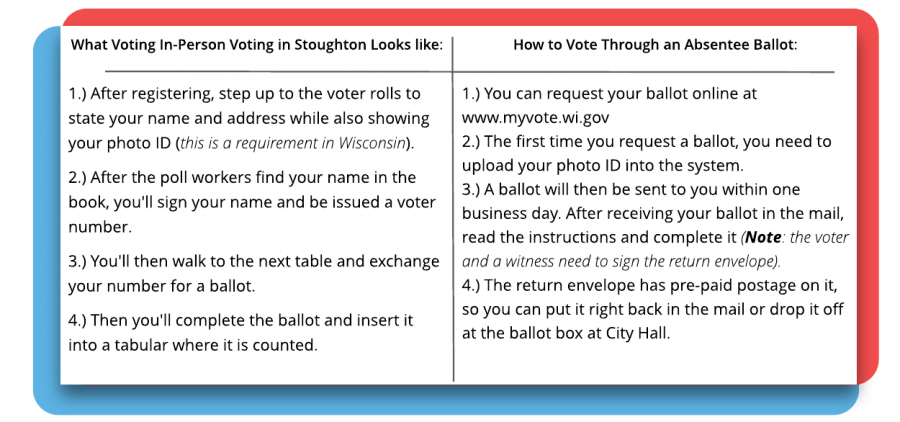
Regardless of how you choose to vote; in person at the polls, or from the comfort of your home, do as the City Clerk, SHS teachers, and countless experts recommend doing: focus not on how you vote, but the policies of the candidates. Times like these bring forth new ideas, new beginnings. Times like these are not meant to divide the country, but allow all citizens the opportunity to reach across the aisle, find common ground, and represent the UNITED in our country’s name.
